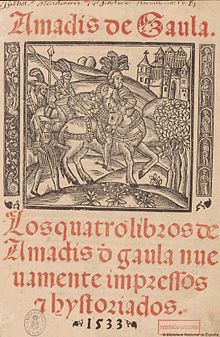Amadís de Gaula (lost chapters of chivalric romance books; 14th century)
Amadís de Gaula is a landmark medieval romance novel series from the Iberian peninsula and the lead character of the said novel. In 1508 Spanish author Garci Rodríguez de Montalvo, published the 1508 edition of the books having claimed to "corrected and emended" the original. The original version of Amadís de Gaula may have been Portuguese in origin, consisted of parchment scrolls bound into leather covers, and may have dated as early as the 13th century. The three original unedited volumes of the Amadis saga are now lost, except for fragmentary remains in the Bancroft Library at the University of California, Berkley.[1]
History
Spanish author Garci Rodríguez de Montalvo had in his possession three surviving volumes of the Amadis saga, which consisted of parchment scrolls bound into leather covers. He altered many violent chapters and altered the original ending, in which Amadis is slain by his son Esplandian. Instead, the saga ends with a double wedding, in which both Amadis and his son marry their lady loves. This published version was enough of a success for Montalvo to write one final book in the saga.
Plot
The book starts with a cross-love story between King Perión of Gaul and Elisena of England. They end up having a child in secret named Amadís. After his birth, Amadís is abandoned by his parents and is raised by a knight named Gandales in Scotland. A wizard named Arcalaús attempts to kill Amadís but is protected by a priestess named Urganda la Desconocida who has gifted the ability of Prophecy. After overcoming the challenges in the enchanted Insola Firme including passing through the Arch of Faithful Lovers, Amadís is knighted. Oriana a childhood friend and Amadís' love interest chastizes him over being knighted and grows jealous of a rival prince. This causes Amadís to descend into madness and go into isolation.
Once a maid is sent, it is only then that Amadís ends his isolation and madness and helps Oriana's father Lisuarte repel an attack on the kingdom. After a secret meeting, Oriana and Amadís have a child named Esplandián. Due to this, Oriana and Amadís must get married, but defer plans for 10 years. During this time, Amadís leaves Great Britain and travels throughout Europe going as far as Constantinople where he secures the favor of the child-princess Leonorina, who will become Esplandián's wife. On his way back, Amadís battles a giant Endriago, which is a monster born of incest. It is at this point that the original manuscript ends.[2] Garci Rodríguez de Montalvo ended up making a fourth book titled Esplandián and was followed up by other books by different authors. Throughout the ages, various continuations of the Amadís de Gaula have been published in Spanish, French, German, and Italian.
Changes Made
It is known that Garci Rodríguez de Montalvo significantly altered the original manuscripts of Amadís de Gaula. The original ending of the third book has Lisuarte, who is poorly advised by greedy counselors, throws Amadís aside, challenges him and tries to marry Oriana to an enemy of the hero. Oriana is rescued by Amadís and takes her to the Insola Firme. Lisuarte sends Galaor (a rival to Amadís) and Esplaindian (whom Lisuarte raised without knowing that he is his grandson) to find Amadís. After multiple battles, Galaor finds Amadís but is killed during his battle. Lisuarte then challenges Amadís but is also killed during the battle. The third person to challenge Amadís is Esplandian. After a very long battle, Esplandian kills Amadís. Oriana, who watches the battle from a window, seeing Amadís' death, and jumps to her death.[3]
Availability
It is unknown what happened to the majority of the original manuscripts of Amadís de Gaula. While a single fragment does remain and is housed at Bancroft Library at the University of California, Berkley, the rest of the manuscripts were most likely destroyed at some point in time. As of the publishing of this article, no more manuscripts have since emerged.
References
- ↑ An archived pdf file for Bibliografía de los Libros de Caballerías Castellanos- Page 129. Retrieved 02 Feb '20
- ↑ The plot for Amadís de Gaula. Retrieved 02 Feb '20
- ↑ An article about the original ending to Amadís de Gaula. Retrieved 02 Feb '20
